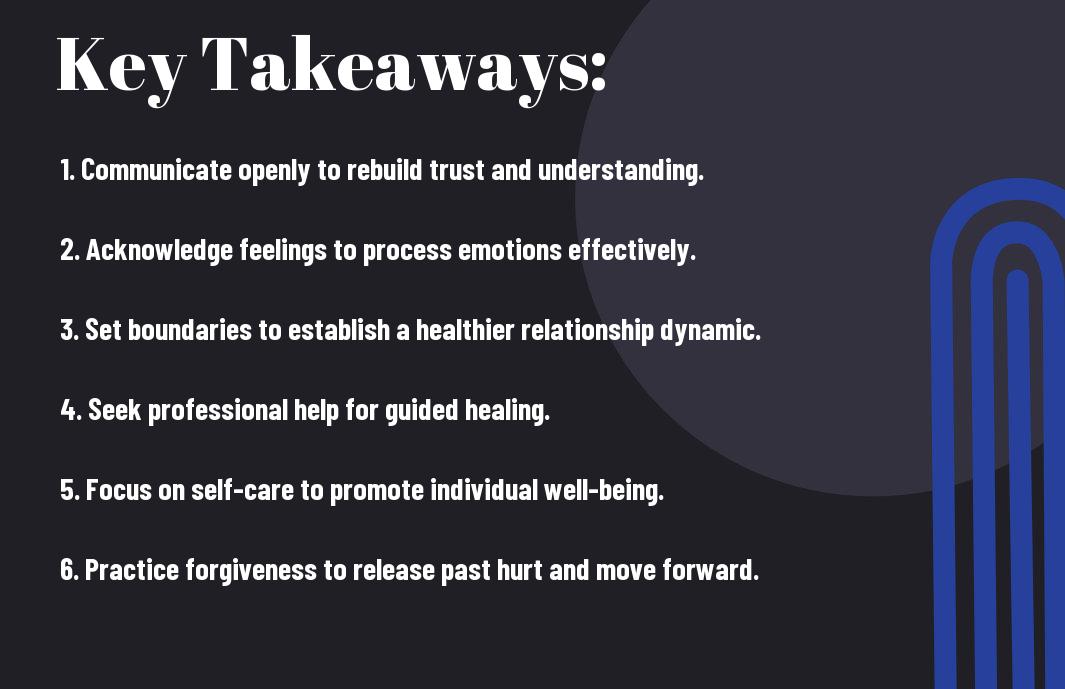Infidelity can lead to deep resentment that complicates your healing process and affects your relationship. If you find yourself struggling with these feelings, it’s imperative to acknowledge their presence and understand their impact on your emotional well-being. This post offers practical tips that can aid you in moving past your resentment, fostering forgiveness, and rebuilding trust with your partner. By actively applying these strategies, you can regain control over your feelings and work towards a healthier, more fulfilling relationship.
Key Takeaways:
- Open communication is necessary; share feelings and thoughts honestly with your partner to create a safe space for discussion.
- Seek to understand the root causes of the infidelity, which can help both partners gain insight and foster empathy.
- Engage in individual or couples therapy; professional guidance can assist in navigating complex emotions and healing correctly.
- Establish boundaries and rebuild trust gradually, ensuring both partners are committed to the healing process.
- Practice self-care and personal reflection to foster emotional well-being, which can aid in processing feelings of resentment.
- Focus on rebuilding your relationship through shared activities, fostering connection and understanding beyond the betrayal.
- Be patient with yourself and your partner; healing from infidelity takes time and effort from both sides.

Understanding Resentment
Before you can effectively overcome resentment after infidelity, it’s necessary to grasp what resentment truly is. This complex emotion often arises when you feel wronged or betrayed, and it can manifest as bitterness or anger. Understanding the roots of your resentment allows you to begin the healing process, enabling you to focus on rebuilding trust and emotional intimacy.
The Emotional Impact of Infidelity
One of the most significant consequences of infidelity is the emotional turmoil it unleashes. Feelings of betrayal, confusion, and anger can overwhelm you, leaving scars that linger long after the initial event. Processing these emotions is vital to reclaiming your sense of self-worth and moving forward in your relationship.
Recognizing Personal Triggers
To move past your resentment, it’s important to identify what triggers your feelings. This awareness allows you to navigate emotional responses that arise in everyday situations. You can learn to respond constructively rather than react impulsively.
The journey to overcoming resentment requires you to explore your emotional landscape. The triggers that ignite your feelings might stem from specific words, actions, or even situations that remind you of the past betrayal. By recognizing these personal triggers, you empower yourself to manage your reactions in a healthier way. This proactive approach allows you to create emotional distance from the pain, setting the stage for healing and growth. Engage in self-reflection, and consider keeping a journal to document your experiences and understand your emotional responses better.
Communication Strategies
You need to establish effective communication strategies to overcome resentment after infidelity. Open dialogue with your partner allows both of you to express your feelings, ask questions, and seek clarity on the relationship dynamics. This can help rebuild trust and foster a deeper emotional connection.
Open Dialogue with Your Partner
Around open dialogue, it’s crucial to create a safe space where both of you can speak honestly without fear of judgment. Approach discussions with empathy and understanding, allowing your partner to share their feelings about the infidelity. This transparency can greatly contribute to healing and rebuilding the relationship.
Active Listening Techniques
Communication is not just about speaking; it also involves truly hearing what your partner has to say. You must practice active listening techniques to ensure that your partner feels valued and understood during these difficult conversations. By doing so, you can cultivate a more supportive atmosphere.
Hence, effective active listening techniques involve paying full attention to your partner, maintaining eye contact, and avoiding interruptions. Show that you are engaged by nodding or providing verbal acknowledgments like “I see” or “I understand.” After your partner expresses their thoughts, paraphrasing what you’ve heard can clarify their feelings, ensuring you grasp their perspective accurately. This method not only promotes a deeper emotional connection but also fosters an environment where both partners feel heard and respected, paving the way for healing.

Building Trust Again
Keep in mind that rebuilding trust after infidelity takes time, patience, and a mutual commitment to change. You and your partner must be willing to engage in open dialogue and address the underlying issues that contributed to the betrayal. For more guidance, check out Battling Resentment After an Affair – monicahumpal.com.
Transparency and Honesty
By fostering an environment of transparency and honesty, you can help rebuild the trust that was lost. It’s vital for both partners to be open about their feelings, intentions, and any past actions, creating a safe space for healing.
Setting Boundaries Together
The importance of setting boundaries together cannot be overstated. Establishing clear limits helps you both understand what is acceptable moving forward and ensures you are on the same page. This process involves discussing emotional and physical boundaries, including how to manage interactions with others that may cause discomfort.
Consequently, setting boundaries together fosters a sense of security and respect in your relationship. When you both take the time to outline your individual needs and concerns, it can mitigate feelings of distrust and anxiety. This partnership in boundary-setting not only strengthens your relationship but also empowers both partners, encouraging personal growth and healthier interaction patterns.
Self-Reflection and Personal Growth
Your journey toward healing after infidelity involves profound self-reflection and the opportunity for personal growth. This phase helps you understand your emotions, values, and the role they play in your relationship dynamics. Embracing this transformation can aid not only in overcoming resentment but also in fostering a more robust sense of self moving forward.
Assessing Your Own Feelings
Between the waves of anger, sadness, and confusion, it’s necessary to assess your own feelings honestly. Digging deep into your emotional responses will allow you to identify underlying issues and personal triggers that may have contributed to the situation. This clarity can be the first step toward understanding your needs and desires in a relationship.
Fostering Emotional Resilience
One way to move forward is by fostering emotional resilience, which helps you bounce back from adversity and diminish feelings of resentment. This involves developing coping strategies that empower you to navigate your emotions and regain control over your reactions.
Personal growth begins with recognizing that adversity can cultivate emotional strength. Engage in activities that promote self-care and enhance your well-being, such as mindfulness practices, journaling, or seeking support from loved ones. Surrounding yourself with positive influences fosters a constructive environment that encourages healing. Building emotional resilience not only equips you to handle future challenges but also enhances your overall quality of life.
Seeking Professional Help
Despite the emotional turmoil you’re experiencing, seeking professional help can provide a structured way to navigate the complex feelings stemming from infidelity. A trained therapist can offer you valuable insights and coping strategies to process your emotions, helping to rebuild trust and communication in your relationship. Professional support can be particularly beneficial in facilitating open dialogue and fostering understanding between you and your partner.
When to Consider Therapy
One of the key indicators that you should consider therapy is when the feelings of anger and resentment become overwhelming, affecting your daily life and relationships. If you find that you are unable to move past the betrayal or if arguments between you and your partner escalate, it may be time to speak with a professional who can assist in guiding you through these challenges.
Choosing the Right Therapist
Around the journey of healing, selecting the right therapist is imperative. Look for someone who specializes in relationships or infidelity and has a proven track record in helping couples overcome similar issues. Your comfort level with the therapist is also important; you should feel safe discussing your feelings and experiences openly. This connection can greatly impact the effectiveness of the therapy.
Hence, take the time to research potential therapists by checking their qualifications and client reviews. Schedule a preliminary consultation to discuss your situation and evaluate how well they communicate and whether you feel understood. Pay attention to red flags, like if they seem judgmental or dismissive of your feelings. A therapist who encourages you to prioritize healing and growth, while offering a balanced perspective, can make a significant difference in your recovery process. Note, choosing the right therapist can be pivotal in fostering a healthier mindset and relationship dynamic.

Moving Forward Together
After navigating the tumultuous waters of infidelity, it’s necessary to focus on building a future together. Moving forward means establishing a shared commitment to healing and openness. Engage in difficult conversations, set mutual goals, and prioritize nurturing your connection. You must approach this journey with patience and a willingness to understand each other’s perspectives to rebuild trust and create a stronger bond.
Creating a New Vision for Your Relationship
With a renewed focus, it’s time to define what your relationship can look like moving forward. Set aside time to discuss your dreams and desires as a couple, identifying shared values and aspirations. This vision should serve as a guiding light, fostering unity and allowing both partners to grow individually while working together to strengthen your love.
Establishing Forgiveness Practices
For the healing process to truly take root, establishing forgiveness practices is necessary. This involves actively choosing to release anger and resentment while fostering understanding and empathy. Make space for open discussions about feelings and consider seeking guidance through therapy or self-help resources when necessary, ensuring you both feel supported in the process.
Plus, incorporating forgiveness rituals can aid in the healing journey. This could involve writing letters, engaging in open dialogues about emotions, or participating in couples therapy. By creating a safe space to express your feelings, you help reinforce the idea that forgiveness is not a one-time event, but an ongoing practice. Embrace the vulnerability of this process, and remember that together, you can transform your relationship into a healthy partnership founded on trust, acceptance, and renewed joy.
Conclusion
With this in mind, overcoming resentment after infidelity requires commitment and effective strategies. You can begin by acknowledging your feelings and communicating openly with your partner. Engaging in self-reflection and seeking support from a trusted friend or therapist can also aid your healing journey. Practicing forgiveness, both for yourself and your partner, is crucial in rebuilding trust and moving forward. By implementing these practical tips, you open the door to a healthier relationship and personal growth, ready to embrace a renewed connection without the weight of resentment.
FAQ
Q: What are the first steps to take after discovering infidelity?
A: The first steps involve acknowledging your feelings and taking time to process the situation. It’s important to communicate your feelings with your partner, whether you want to confront them directly or express your hurt in writing. Engaging in counseling can also be beneficial, as a professional can guide you through the emotions and help you both understand the underlying issues that led to this situation.
Q: How can one effectively communicate feelings of resentment without escalating conflict?
A: To communicate feelings of resentment effectively, use “I” statements to express your feelings without blaming your partner. For example, instead of saying “You betrayed me,” you might say, “I feel hurt and disappointed by what happened.” This encourages dialogue and creates a safe space for both partners to express their thoughts and emotions without becoming defensive.
Q: What role does self-care play in overcoming resentment after infidelity?
A: Self-care is vital in the healing process after infidelity. It involves prioritizing your own well-being through activities that promote relaxation, enjoyment, and emotional health. This could include spending time with supportive friends, engaging in hobbies, exercising, or journaling. Taking care of yourself helps rebuild your self-esteem and can create a positive foundation for moving forward.
Q: How can couples rebuild trust after an affair?
A: Rebuilding trust requires transparency, commitment, and time. Both partners need to be willing to engage in open discussions about the affair and its impact. The unfaithful partner must demonstrate accountability by being honest and open about their actions. Additionally, establishing new boundaries and improving communication can create a safer emotional environment for both partners as they work towards rebuilding trust together.
Q: When is it appropriate to seek professional help in coping with resentment after infidelity?
A: Seeking professional help is appropriate when feelings of resentment become overwhelming or interfere with daily life. If the emotional pain persists, or if communication with your partner is consistently unproductive, a therapist can provide tools and support to facilitate healing. Therapy can also help identify patterns and underlying issues in the relationship that need to be addressed.
